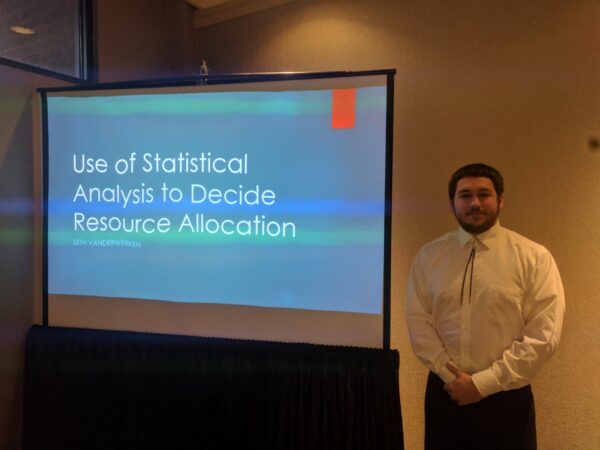- About
- Future Students
- Academics
Academic Resources
- Current Students
My MHU ToolsAdult & Graduate Studies
- Athletics
- Alumni / Give
Mars Hill University Student Presents Research on Predicting Terrorist Attacks
September 1, 2017
 A Mars Hill University criminal justice major has conducted research that he hopes could lead to better prediction of where anti-terrorism efforts would be most effective. Seth VanDerwerken, a senior from Denver, North Carolina, used information contained in the Global Terrorism Database, to test whether characteristics of the target of a terror attack could be used to predict the scale of the attack, and thus influence how anti-terrorism resources are allocated.
A Mars Hill University criminal justice major has conducted research that he hopes could lead to better prediction of where anti-terrorism efforts would be most effective. Seth VanDerwerken, a senior from Denver, North Carolina, used information contained in the Global Terrorism Database, to test whether characteristics of the target of a terror attack could be used to predict the scale of the attack, and thus influence how anti-terrorism resources are allocated.
The Global Terrorism Database is an open-source database that includes information on more than 150,000 terrorists events that have happened worldwide from 1970 through 2015. It is maintained by the National Consortium for the Study of Terrorism and Responses to Terrorism (START) at the University of Maryland. START describes it as the world’s most comprehensive unclassified database on terrorist events.
VanDerwerken presented his research at the 54th annual meeting of the Academy of Criminal Justice Sciences, held March 21-25 in Kansas City, Missouri. In addition to criminal justice students from other universities, the audience for his presentation included terrorism researchers and criminal justice professionals from across the country.
VanDerwerken was mentored in his research by Taylor Brickley, Ph.D., an assistant professor in Mars Hill University’s criminal justice program. The program exposes students to a wide range of issues associated with the U.S. criminal justice system. It is designed to prepare them for the world of work by focusing on ethical dilemmas faces by criminal justice professionals; the role that gender, race/ethnicity, and socio-economic status play in the production and social control of crime; and the importance of scientific inquiry for criminal justice policy making.